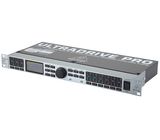I've been running a bunch of these, both in rental and installation usage and these run great. They are able take tremendous amounts of abuse and still beat up the big boys. Spill a drink on a device that costs more than four times what this little beast does and your night is ruined. Do that on a DCX and it still runs fine, of course buttons will be a bit sticky but that's all. Outdoor events are no problem, and it performs as well on a sunny beach as during the coldest Finnish winter nights.
It's a bit shame that this device doesn't have a modern interface connection and only comes with a outdated RS-232 serial port. However, the UI is great and every option is configurable from the front panel only. There are some caveats what comes to channel naming and initial setup (especially this is extremely misleading - DCX's routings are not limited to what initial setup offers), but once one does that a couple of times the rest is simple. DCX's UI easily beats up in usability some of the higher end gear that are either software-only configurable or front panel driven.
One of the most useful feature is dynamic EQ. It may sound a bit ankward at first, but for fixed installations it's terribly useful for compensating eg. lack of bass when the night is still young and sound levels are quote low. As it may be applied as well for outputs as inputs, it doesn't eat up all DSP resources. DCX doesn't have unlimited resources, but they'll grant EQs in all inputs, steep HP/LP and limiters in all outputs. The percentage of remaining DSP resources is readily shown, which is not always the case with these kind of devices regardless the make.
Of course, the DCX and it's cheap price only gets it so far. Connectors are pretty poor, feel flimsy and are no match for brand names. Also, the third input channel is pretty useless as only two channels may be summed together. Neither input nor output sensitivity is selectable, but usually it's something that one can live with. In a prolonged installation usage internal power supply will eventually fail after a few years as the input caps dry. When that happens, usually most of the input and output channels are also destroyed thus rendering the device beyond any economical repair. Diyers take note.
While DCX gradually fades in obscurity at this pace (due to lack of modern interfaces or any real hardware upgrades within the past 10 years), it still offers a great bunch of features for a fraction of price what more modern devices cost. Unless more input channels (consider this as a two channel device) or a network connectivity is required, I'd still buy DCX and a spare unit to go along as nothing is eternal.


